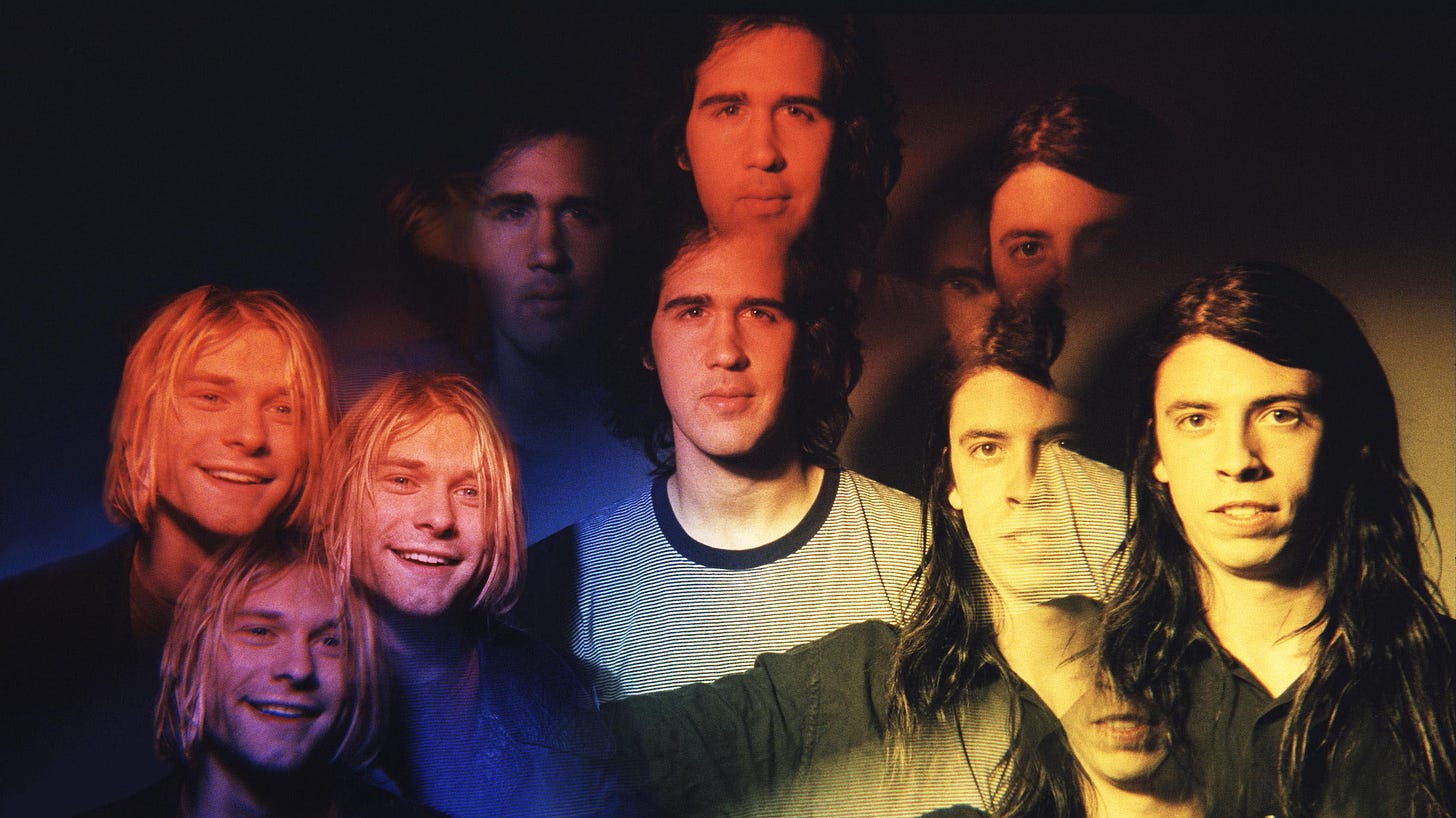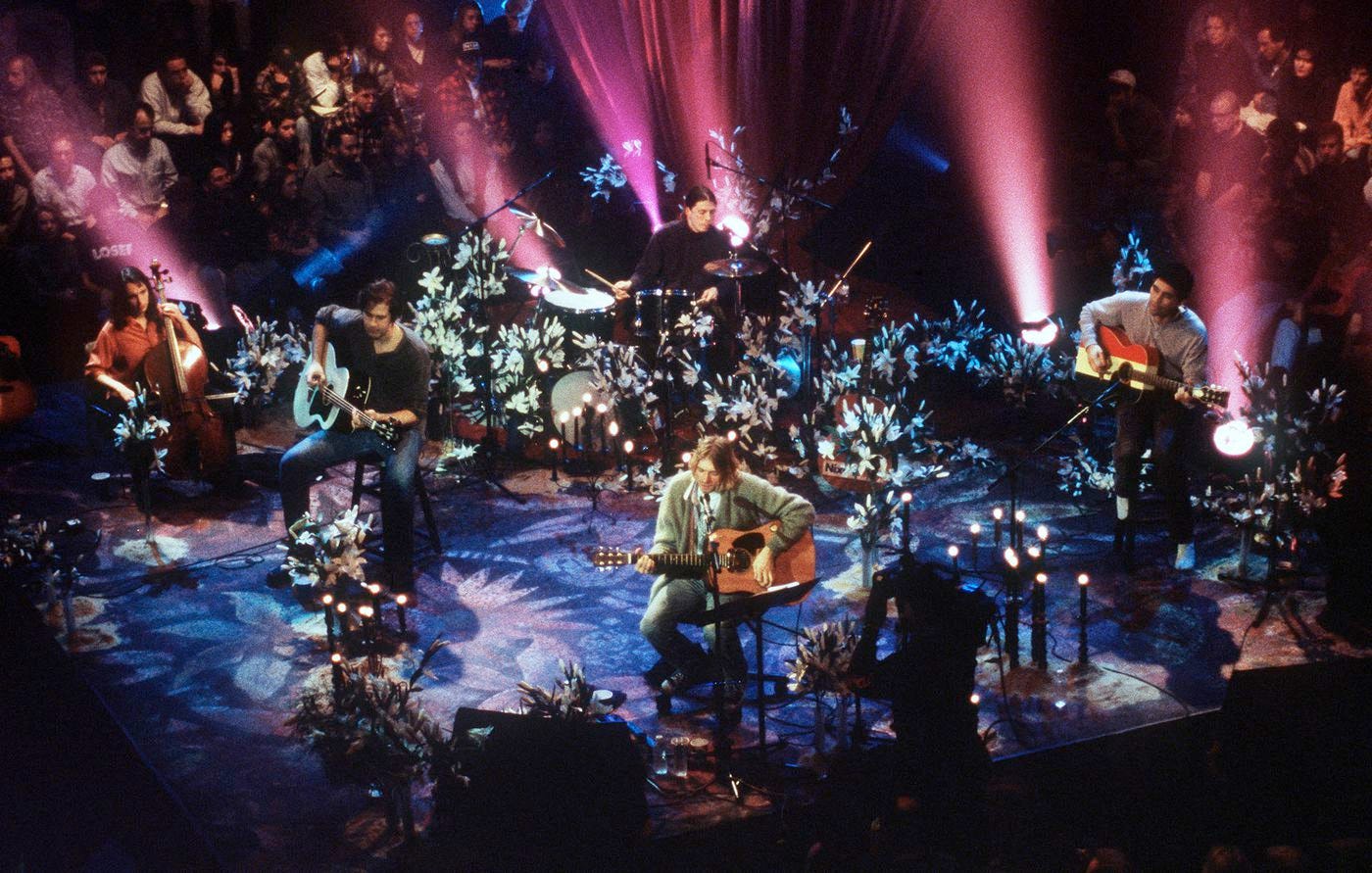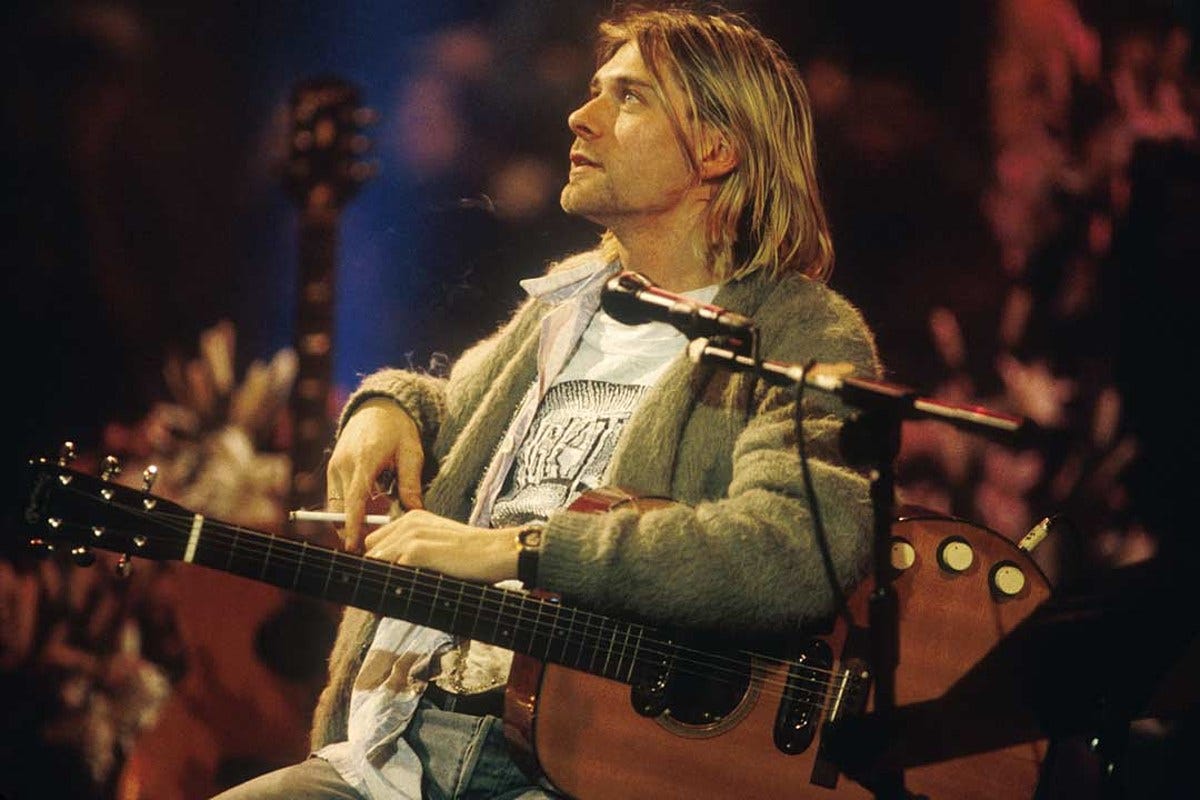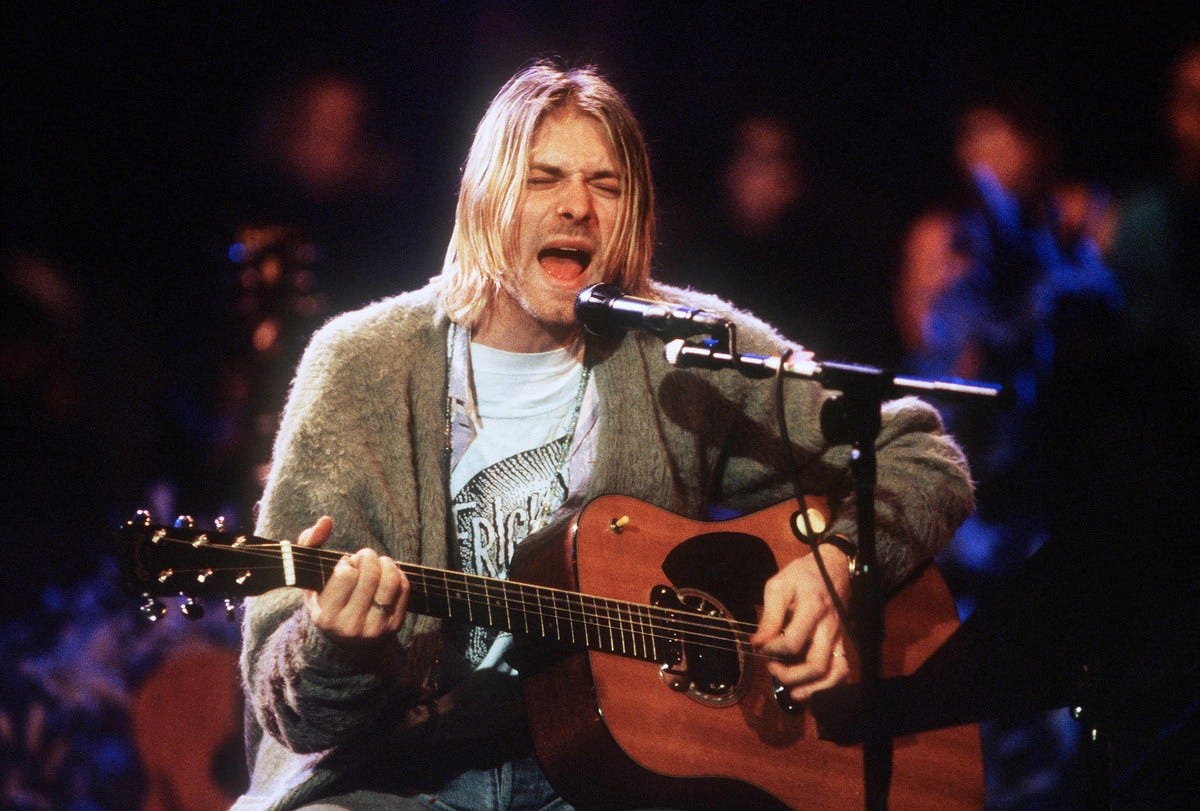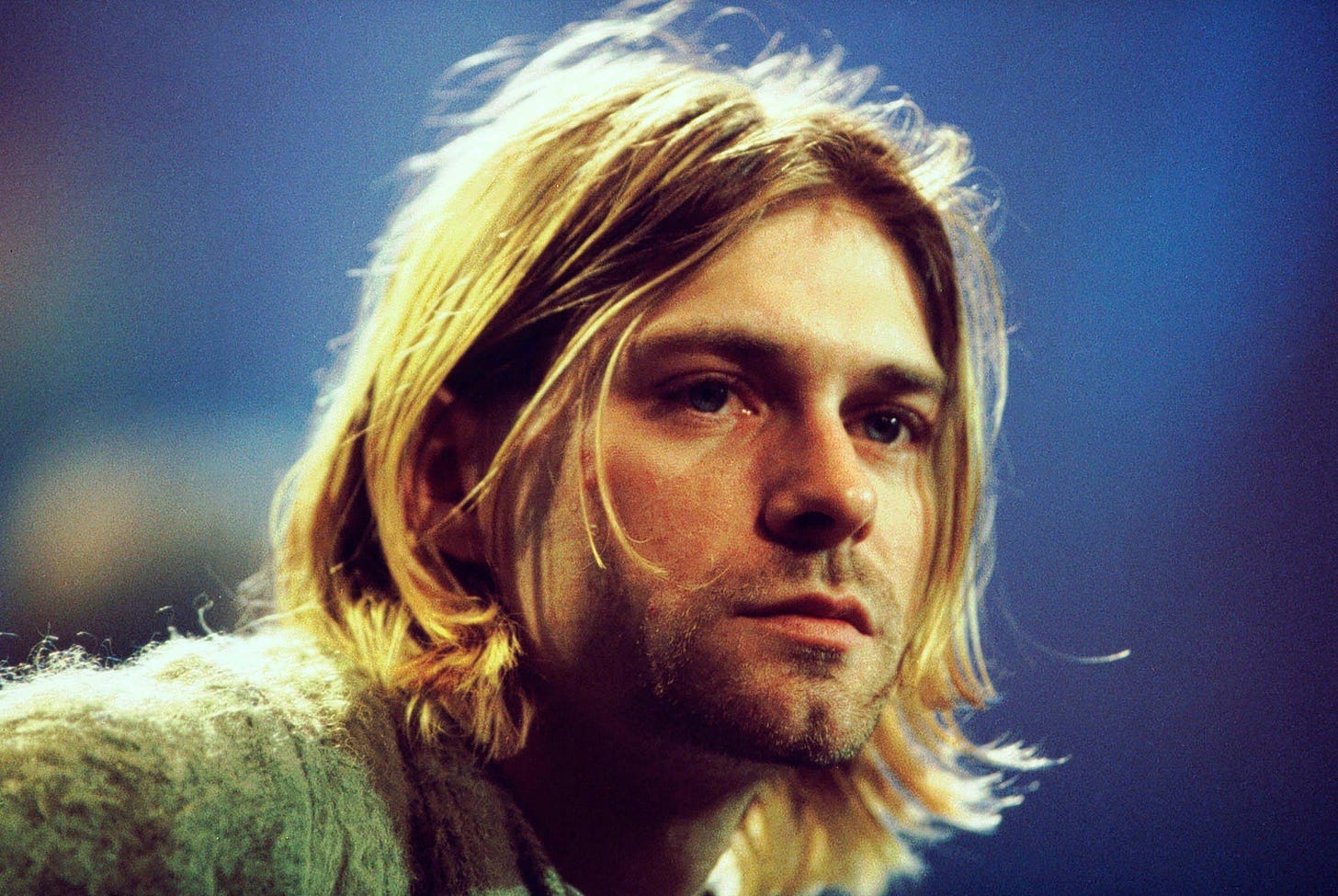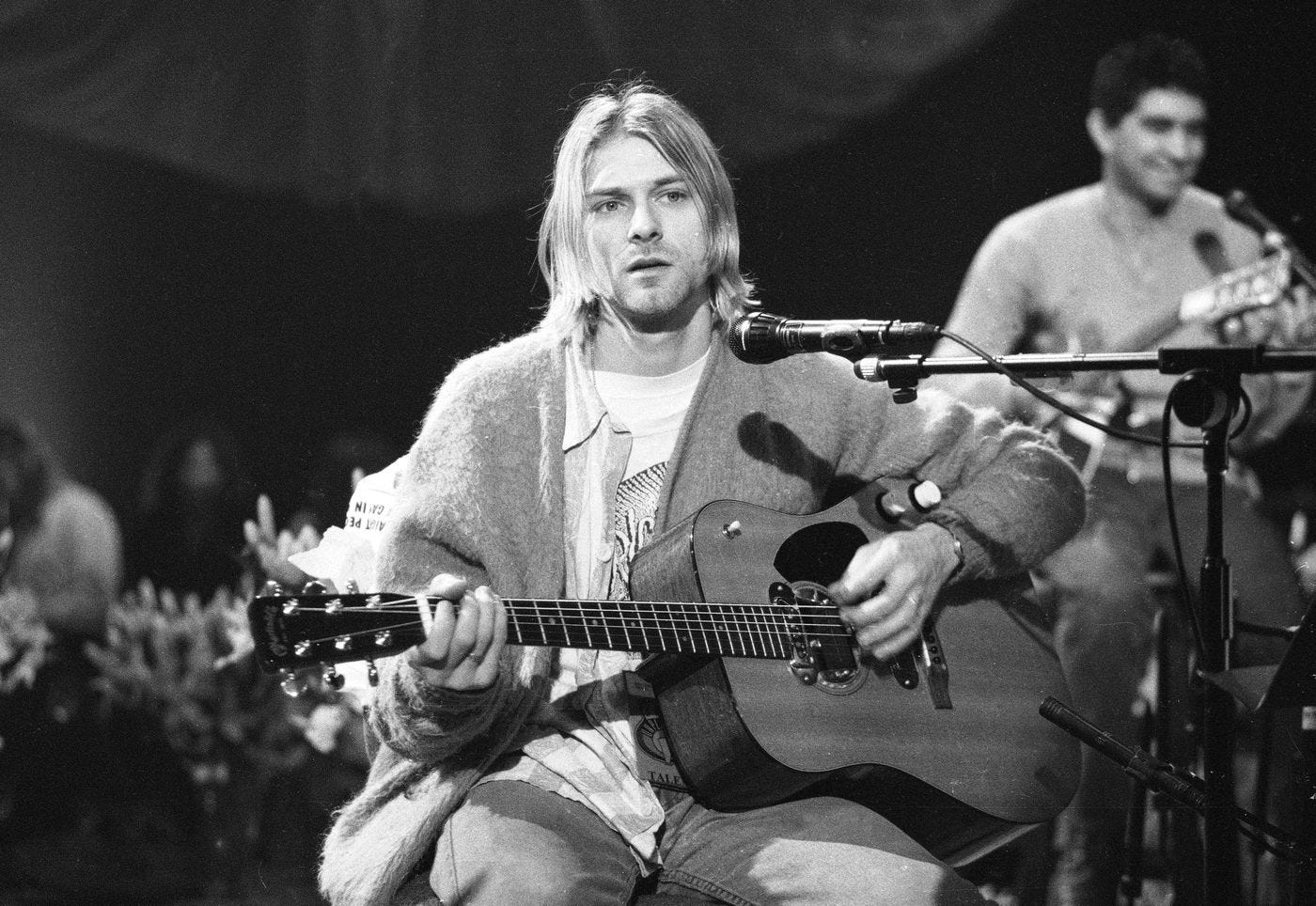Nirvana’s MTV Unplugged in New York: The Tragic Beauty of Kurt Cobain’s Last Stand
Nirvana wasn’t supposed to be THAT band. But they were. And 30 years ago, the posthumous release of 'MTV Unplugged in New York' moved the world with Kurt's final, haunting note.
On November 18, 1993, Nirvana took the stage for MTV’s Unplugged series—a moment in music history that no one could have predicted would become one of their most defining live performances. This wasn’t the raucous, distorted Nirvana of stadium anthems. It was something more vulnerable, raw, and intimate.
MTV Unplugged in New York didn’t just redefine Nirvana’s legacy—it solidified it.
But to understand how we got to that night, we need to go back to the very beginning, to the birth of a band that forever altered the course of rock music.
Hi, I’m Andy Fenstermaker, host of Poetic Wax, a weekly music history series in which I dig into the bands, albums and songs within the fast record collection I started back in the 1990s. I’d appreciate it if you subscribed. It’s free, and new episode transcripts go up every week.
Kurt had passed a year prior to when I finally fell in love with Nirvana, but his passing was no less impactful to my newly minted teen self. This is the tragic beauty of Kurt Cobain’s last stand. This is the story of MTV Unplugged in New York.
NIRVANA’S RISE TO FAME: THE TEEN SPIRIT PHENOMENON
Nirvana wasn’t supposed to be that band. Formed in Aberdeen, Washington, in 1987, they emerged from the grunge scene alongside acts like Mudhoney, Soundgarden, and Alice in Chains. Led by the enigmatic Kurt Cobain, Nirvana’s early work—like their debut album Bleach (1989)—didn’t cause much of a ripple outside the underground scene. But it was their second album, Nevermind (1991), that literally changed everything.
It was "Smells Like Teen Spirit," the opening track, that became an anthem for disaffected youth around the world. The song’s explosive intro—a combination of Kurt Cobain’s gritty guitar riff, Krist Novoselic’s driving bass line, and Dave Grohl’s thunderous drumming—hit the mainstream like a freight train. And the lyrics, although often ambiguous, were a rallying cry for Generation X.
In Kurt Cobain’s words, “I never wanted to sing the anthem of a generation. It just happened.”
With the success of Nevermind, Nirvana found themselves catapulted to international fame. But fame didn’t sit comfortably with Cobain. He once said, “I’m too stubborn to allow myself to ever compromise our music or turn us into a joke.” The pressure of fame, the media’s obsession with his personal life, and Cobain’s own struggles with addiction began to weigh heavily on the band. This tension would shape their music and, ultimately, their tragic story.
MTV UNPLUGGED: THE LEAD-UP TO A HISTORIC NIGHT
By 1993, Nirvana was one of the biggest bands on the planet. But Cobain’s relationship with the spotlight was strained. The Unplugged series offered the band a chance to do something different. Traditionally, Unplugged performances featured bands playing stripped-down, acoustic versions of their hits. But Nirvana had other ideas.
From the start, Cobain was clear: this wouldn’t be a typical Nirvana show. He wasn’t interested in playing the big hits. In fact, they only played one song from Nevermind—"Come As You Are." Instead, Nirvana chose lesser-known tracks, deep cuts, and a selection of covers that reflected Kurt’s diverse musical tastes.
There was no bombast, no distortion pedals, no signature smashing of instruments. This was Nirvana laid bare, their rawest selves. Cobain sat center stage, draped in a cardigan, surrounded by lilies—a setup that felt more like a funeral than a rock show. In hindsight, many have interpreted the visual elements and the setlist choices as prophetic, a hint of the tragedy to come. Yet at the time, it simply felt like Kurt Cobain was trying to create something personal and profound.
In his book Serving the Servant, former Nirvana manager Danny Goldberg comments on the direction Cobain was leaning prior to his death in 1994. He hints that Kurt was exploring a quieter, more intimate, and more emotionally resonant sound. Had he lived, it’s likely that Nirvana’s follow up to In Utero would have been closer to Unplugged than Nevermind.
THE SETLIST: SONG CHOICES THAT MADE HISTORY
One of the most striking aspects of Nirvana’s Unplugged performance was the song selection. Of course, fans were treated to favorites like "Come As You Are" and "All Apologies," but the real heart of the show lay in its surprises.
The band’s haunting cover of David Bowie’s “The Man Who Sold the World” remains one of the most iconic moments of the night. Bowie himself later commented on Nirvana’s version, saying, “It was heartfelt. And that’s really what it’s all about. It takes on a life of its own.”
Nirvana’s willingness to embrace the unexpected also came through in their selection of songs by lesser-known bands like The Vaselines and Lead Belly. Their cover of Lead Belly’s “Where Did You Sleep Last Night?”—the final song of the evening—was perhaps the emotional peak of the performance. Cobain’s guttural, anguished howl at the end of the song has been etched into the minds of fans and critics alike. It was as if, for a moment, we saw into the very soul of Kurt Cobain—a soul that was in pain, deeply passionate, and in some ways, screaming for help.
THE PERFORMANCE: RAW EMOTION AND VULNERABILITY
What makes Unplugged in New York so timeless isn’t just the setlist or the covers—it’s the emotional rawness that Kurt Cobain brought to the performance. Despite his growing discomfort with fame and his personal struggles, Cobain delivered a vocal performance that was nothing short of breathtaking.
His voice cracked, not from lack of skill, but from something far deeper. He seemed at times fragile, other times defiant, and always genuine. That authenticity connected with audiences in a way few performances have before or since. The vulnerability of the acoustic format, combined with Cobain’s reluctance to embrace the expected, made for a perfect setting.
Nirvana’s MTV Unplugged was also notable for its lack of flashy production. There were no encores. Cobain himself made it clear that there would be no second performance after "Where Did You Sleep Last Night?"—leaving the audience hanging on a final note of beautiful despair.
AFTER THE SHOW: THE TRAGIC FINAL CHAPTER
Less than six months after Nirvana’s Unplugged performance, Kurt Cobain was gone.
His death in April 1994 shook the world. Fans were left with a profound sense of loss, not only for the man himself, but for the music that would never be made. MTV Unplugged in New York, released posthumously, took on an even greater meaning in the wake of his passing.
In a way, the album felt like Cobain’s last gift to the world—an intimate portrait of a man who, despite his struggles, still believed in the power of music to connect people.
Music journalist Charles R. Cross reflected on this in his biography Heavier Than Heaven, writing:
“On that stage, Kurt was not the rock star burdened by fame. He was simply an artist, stripped of pretense, sharing his truth.”
In the years since Kurt Cobain’s death, Unplugged in New York has become more than just a performance—it’s a cultural touchstone. Unlike many of the grunge era’s louder, angrier anthems, this performance has aged with a quiet dignity. It showcases the depth of Nirvana’s musical range and Kurt Cobain’s ability to channel emotion in its purest form.
To this day, Unplugged in New York is celebrated as one of the greatest live albums of all time. The album showcases Nirvana’s enduring influence on music and culture, but more importantly, Kurt Cobain’s vulnerability as an artist.
In one of his final interviews, Kurt said, “I’d rather be hated for who I am than loved for who I am not.” That sentiment resonates throughout Unplugged. It wasn’t Nirvana trying to please the masses. It was Kurt Cobain, laid bare—his voice, his spirit, his humanity—all captured in a single, unforgettable night.
THE FINAL, HAUNTING NOTE
The legacy of Nirvana’s Unplugged in New York is one of profound emotional resonance. It’s an album that isn’t defined by loud guitars or rebellious anger, but by the quieter moments of introspection and vulnerability.
For Kurt Cobain, it was perhaps the purest expression of who he was—an artist deeply in tune with his pain, yet still seeking connection through music. In the end, Unplugged is more than just a performance; it’s a reminder of the fragility of life and the lasting impact of genuine artistry.
Cobain’s voice, cracking with emotion, still echoes in that final haunting note of “Where Did You Sleep Last Night?”—a note that, even now, makes the world stop and listen.
And in the silence that follows, we remember Kurt.




